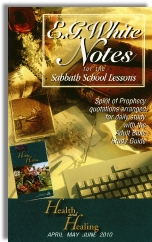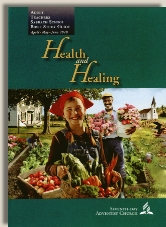|
||||||||||||||
Commentary on "Introduction to Health and Healing"
The lessons for this quarter are on the subject of health and the Bible. The topic of environmental health will also be addressed.
Let’s begin with the photograph on page 2 of the Teacher’s Quarterly. It is captioned “The Redemption of our Bodies.” Romans chapter 7 and 8 are two very powerful Bible passages that help us understand the meaning of that phrase. The phrase comes from Romans 8:23 which reads:
And not only the creation, but we ourselves, who have the firstfruits of the Spirit, groan inwardly as we wait eagerly for adoption as sons, the redemption of our bodies.*
The Redemption of Our Bodies
In Romans 7 and 8, it is presented that the redemption of our bodies is something that will take place in the future. It is not a present reality.
We are told in a number of places of Scripture that our bodies are important. Our bodies are the temple of the Holy Spirit (1 Cor. 6:19), it is possible to be holy in both body and spirit (1 Cor. 7:34), we can offer the members of our body as instruments of righteousness to God (Rom. 6:21-13), and that we are to present our bodies as a living sacrifice (Rom. 12:1).
The lesson author is careful to not state that disease and illness are a result of sin in a person’s life. In avoiding this connection, the author does not make the same error that is made by some in the Charismatic movement. Avoiding this extreme, the author does make some statements that must be checked with Scripture to determine if what is being presented is in accordance with God’s word, or is in accord with some other standard.
Israel, Health and Disease
In the second paragraph of page 2 of the Teacher’s Quarterly the following statement is made:
If they followed what the Lord commanded them to do in the area of health and sanitation, as opposed to what their captors did (for instance, while the Egyptians used human excrement for medicinal purposes, the Hebrews were to bury theirs outside the camp), they would be spared the ailments that afflicted the Egyptians.
Let’s turn to Exodus to see what the Lord said to Israel and see if it matches up. Exodus 15:26 reads,
If you will diligently listen to the voice of the Lord your God, and do that which is right in his eyes, and give ear to his commandments and keep all his statutes, I will put none of the diseases on you that I put on the Egyptians, for I am the Lord, your healer.
Initially it appears that the lesson is in accordance with the Bible. It will be important to note that the Bible states that it is the Lord who does or does not put diseases on the Israelites and the Egyptians. However, just above that statement from the quarterly, we read the following, also on page 2:
The promise of immunity from Egypt’s diseases was given to the children of Israel soon after they left their captivity. Yet, this promise wasn’t based simply on supernatural intervention; it was based also, maybe even especially, on the natural laws of health.
The statement here that a promise of immunity from Egypt’s diseases was based “also, maybe even especially, on the natural laws of health” is a direct avoidance of the fact that it is Almighty God in his sovereignty who causes disease and health. When we begin to identify the acts of God as “maybe even especially … natural laws” we are using pantheistic wording. This is ascribing to nature, attributes that belong only to God. (Ironically, this is what John Harvey Kellogg was accused of in his book, The Living Temple. Reading The Living Temple, one can see that Kellogg, far from being a Pantheist, was quite an orthodox Christian in his statements about God in nature.)
Jesus, Modern Science and Bodily Training
Modern science has helped us understand some of the ways we become ill, and ways we can avoid certain types of illness. But that is where science must stop and Christianity must begin, or continue. It is here that we must identify God as the ultimate source of life and death.
In doing this, we are not equating illness or death with sin. If this were the case, we would have to say that God sins or causes sin, which is never the case. Yet it is a fact that, as Jesus told us, God himself brings good things to both the evil and good, to both the unjust and just. Jesus said, in Matthew 5:43-45:
You have heard that it was said, ‘You shall love your neighbor and hate your enemy.’ 44 But I say to you, Love your enemies and pray for those who persecute you, 45 so that you may be sons of your Father who is in heaven. For he makes his sun rise on the evil and on the good, and sends rain on the just and on the unjust.
When looking at the promises of God to Israel, we must be careful when transferring those promises to Christians. Not all promises to Israel are for Christians. This particular instance of Israel leaving Egypt with Gods promise must be kept with the condition of the promise. The condition was stated as, “If you will diligently listen to the voice of the Lord your God, and do that which is right in his eyes, and give ear to his commandments and keep all his statutes…”. When God finished giving Moses all of his commandments and statutes to the nation of Israel, they were unable to keep them.
If health and disease were a based “especially” on the natural laws of health, then how could Jesus say that his Father sends good things to the evil and good people alike? Although there are good health practices, and we are wise to follow them, those health practices are not spelled out in the Bible. These modern health practices come from modern science. And modern science is limited. There is much about health and disease that is still completely unknown to modern science and health practitioners. We are wise to heed their advice, but become unwise when we attribute all things to natural laws. When we attribute all these things to natural laws, we become pantheists.
The Bible does not provide much information about training one’s body. Yet with modern science and health, we know how important it is to train our bodies, and to subject our bodies to regular workouts and exercise. Of course there are statements in the Bible that physical training is good, scripture is also clear on its limitations. First Timothy 4:7-8 is clear on this. It reads:
Have nothing to do with irreverent, silly myths. Rather train yourself for godliness; 8 for while bodily training is of some value, godliness is of value in every way, as it holds promise for the present life and also for the life to come.
It is interesting to note here how little importance bodily training has when the issue of godliness is presented. Note that those things that have promise for the present life alone are of “little value.” Given this, it may seem strange to some that an entire quarter of Sabbath School and Bible study is being devoted to the subject of health and healing. This is a subject that is heavily studied in the cult of Christian Science (First Church of Christ Scientist) and by some in the Word Faith movement, but should have little (we’re not saying “none”) place in a Christian church. We should be more concerned with those things that hold promise “for the present life and also for the life to come.”
Since we must spend more time on those issues, let’s take a look at one more paragraph on page 3 of the Teachers Quarterly.
Why Did Jesus Die?
In the second paragraph of page 3 we read:
Thus, this quarter we are going to look at what’s often been a neglected aspect of the wonderful truths God has given us as a movement, and that is the health message.
First, note that these “wonderful truths” are something that God has “given us as a movement.” It is not the message of Jesus Christ, the Bible or Christianity. The Seventh-day Adventist Church has spent lifetimes and significant amounts of money on a subject that may have some benefit for some people for a limited amount of time. This church has been in existence for 147 years. It is late on the scene with a health message that is for this present world only. Any health message becomes inconsequential when a person dies.
In stating that the health message is a means by which to present the Gospel is avoiding the fact that, within even the most Stoic of individuals, there is a desperate longing for God and reconciliation with him. We don’t need to “set the stage” to present the Gospel. It is in this way that Jesus becomes the best example for us. He simply met people where they were, loved them as they are, asked them to sin no more and follow him. We can to likewise.
In finishing that second paragraph on page 3, the lesson author states:
The Lord revealed these principles to us for the same reason He died for us, because He loves us and wants what’s in our best interest.
Jesus did die because he loves us. He did not die because he wants “what’s in our best interest.” One could argue words and make a case for this, yet when the bottom line is reached, Jesus died to appease the wrath of his Father and reconcile us to himself. He died to pay the penalty that was due us, that we might receive the reward that was due him.
The health message is claimed to be a message that is in our “best interest.” If this can only be true while we live, then it cannot be much of a message in our best interest. Our interest must lie in the present and eternity, not only in the present. It must be in Spirit and truth, not in flesh and circumstance.
Summary
- We are awaiting the redemption of our bodies which is a future reality. The redemption of our bodies and good health practices are two different things.
- God made promises to Israel. Not all promises to Israel can be applied to the Church.
- God’s promise of health to Israel was not based, “especially, on the natural laws of health.”
- We must not take attributes that belong only to God and apply them to nature. We are playing with Pantheism when we do this.
- Health and bodily training is of “some value.” Godliness is of value in every way.
- Jesus taught that God causes good to happen to both good and evil people.
- Jesus died because he loves us and to take the wrath of the Father. He accepted what was due us so that we can accept what is due him.
* All scripture passages are from the English Standard Version, ESV, 2001, unless otherwise indicated.
Copyright 2010 BibleStudiesForAdventists.com. All rights reserved. Revised March 25, 2010. This website is published by Life Assurance Ministries, Glendale, Arizona, USA, the publisher of Proclamation! Magazine. Contact email: BibleStudiesForAdventists@gmail.com.
The Sabbath School Bible Study Guide and the corresponding E.G. White Notes are published by Pacific Press Publishing Association, which is owned and operated by the Seventh-day Adventist church. The current quarter's editions are pictured above.
Official Adventist Resources
Standard Edition Study Guide Introduction
Teacher's Edition Study Guide Introduction


